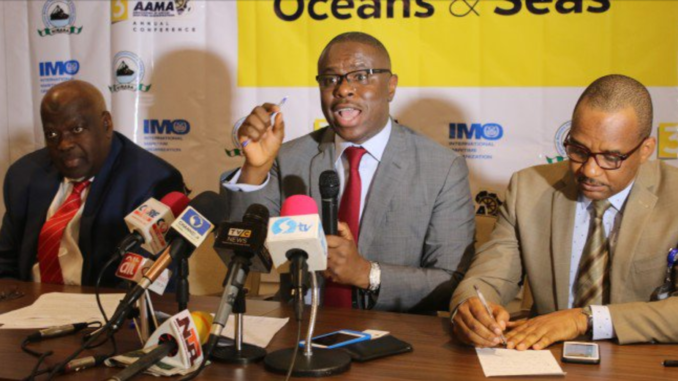
Really, I’m not sure why most Nigerians decide to concentrate energy on a man who is in a pickle. I can only think of one thing: human psyche.
Of course, the public’s right to know and the obligation of the Aso Villa to tell became a confluence of conflict in our political debates in recent time with President Muhammadu Buhari’s sickness and his resort to medical help in London, United Kingdom.
As common with a time like this one, facts and substance became the victims of the campaign on both sides.
Tellingly, the drums outside there have different sounds but they are being beaten for a single masquerade.
In his own case, President Buhari has said in his broadcast on Monday that the market noise can only pull him further into distress.
Unfortunately, the headlines have gone against him since he returned. From a speech considered by many as impotent and lacking in strategy to rat race inside his office that made him surrendered, President Buhari must be thinking why on earth is he back into a storming situation.
But for his sickness this is an auspicious time for Buhari to be preparing his political party, the All Progressives Congress (APC) to retain power in 2019, either for him or for another candidate of his choice, in the case that he decides not to contest.
Naturally, this is the time for political rally from one state to another to showcase the good works of his administration as groundwork for 2019 elections. But that appears to be hamstring by his health condition and lack of unity among the party leaders.
Interestingly, the president’s scorecard is best looked at by reviewing the works of the president’s men.
Two agencies in a tinpot situation inherited by Buhari are Nigerian Ports Authority and Nigerian Maritime Administration and Safety Agency. The two agencies were drifting downwards before Buhari appointed a woman and a man to change the narrative.
Dr. Dakuku Peterside, Nigeria’s maritime agency’s chief operating officer is amazing. His life comes nothing short of that too.
Aged just 47, and arguably one of the most successful and fascinating popular progressives in Nigeria, Peterside looks to have a very big future ahead of him. In a party desperately short of star power, he glitters all the more brightly.
The details of Dakuku’s profile in success are in NIMASA. Within 16 months of being under a new administration, NIMASA witnessed a remarkable turnaround that has catapulted Nigeria into Maritime Heaven. From a digitized operation to harnessing international agreement for a reform, Peterside placed Nigeria under Buhari in global record of strong maritime administration.
Yes, after a recessionary period triggered by declining oil prices, Africa’s biggest economy has chosen an aggressive diversification route, to buoy up its economy. There have been huge speeches and policies devoted to reviving agriculture and local industry as parts of efforts to diversify government revenue, however, the key to the country’s diversification strategy is the maritime industry, where opportunities for growth are huge and diverse.
As at 2016, the Nigerian maritime Industry was estimated to exceed $153 billion, representing about 30 per cent of the country’s GDP. And with a vast coastline of over 850 kilometres, the possibilities are truly endless.
What more, Peterside has managed NIMASA to the extent that the agency that was once isolated by the world for its corruption and inefficiency is now the darling of several global maritime organizations.
For instance, Nigeria is set to benefit from deep sea mining through effective harnessing of the opportunities stemming from working with the International Seabed Authority (ISBA).
The ISBA, which is an autonomous international organization established under the 1982 United Nations Convention on the Law of the Sea and the 1994 Agreement relating to the Implementation of Part XI of the United Nations Convention on the Law of the Sea, will help the country in the area of capacity building to survey deep sea and establish a database of mineral resources available for the benefit of all mankind.
At the moment, the Nigerian Navy Hydrographic office is undertaking hydrographic survey and charting of the country’s maritime area, while NIMASA cooperates with the Navy to effectively enforce the United Nations Convention on the law of the sea and other relevant international maritime instruments.
To be frank, opportunities for growth in Nigeria’s maritime administration are huge and diverse.
For a count, NIMASA operates a 24-hour surveillance system, which captures all vessels in the Nigerian maritime domain, irrespective of weather conditions. The agency can now achieve a complete profile analysis, which includes the flag, registered owner, operator, beneficial owner and movements over a specified period, capabilities which enables it to take swift decisions, real-time, on any targeted ship. Within ten months, NIMASA had reduced the rate of sea accidents by 51 per cent – a record that prompted countries like the United States to send envoys to the reinvigorated agency for partnership.
And this, under Peterside, Nigeria will soon take delivery of the fifth largest floating dock in Africa, which is expected to be delivered by the last quarter of the year.
Really, I am not surprised that Peterside surpassed his predecessors in less than a year following his appointment, I predicted it in an article headlined ’NIMASA’s silver lining is Peterside’s golden opportunity,” published in April 2016, a few days after his appointment. Now, can Buhari’s scorecard be looked upon in Peterside’s achievements? Absolutely!
END

Be the first to comment